Everyone has a perspective, a “point of view,” or POV, if you will. We all have a vantage point from which we perceive the world around us with our senses and, moreover, everyone has their own way of thinking and feeling about what they are perceiving with those senses.
Thinking and feeling are interconnected. Thinking and feeling certain ways can cause a person to say certain things and behave in certain ways, and then, one will feel and think certain ways after having said or done what one has said and done because saying certain things (to yourself or out loud) and behaving in certain ways reinforces what one already thinks and feels.
It’s a loop, really.
If you’re not happily looping, however, there is a way out, and, once out, one is free to enjoy without needing anything or having to go anywhere and with the added bonus of a light-hearted happy feeling of good humor.
What could be better?

It begins with cultivating an awareness of how one’s thoughts affect one’s feelings. As an online grief assistant put it (not that you’re grieving, but this applies to all feelings), “When your thoughts appear to be the product of your overwhelming sadness and grief, know that it is your thoughts that are feeding the sadness rather than the other way around. Your thoughts generate a feeling which you then act upon” (“How our thoughts govern how we feel“).
When you have a good, bad or indifferent thought, a matching good, bad or indifferent feeling will be the result. It’s all cause (thought) and effect (feeling) in a chain of causes and effects.
If one isn’t aware of how one’s thoughts affect one’s feelings and thus one’s self and the world at large, one can unknowingly let thoughts get the better of one by looping in a way that limits or eliminates happiness, because happiness, if you dig into it, is the ground of one’s being. Happiness is there all the time in the background before we muddle ourselves with thinking and feeling.
Cue music:
As a kid you were probably naturally happy, that is, unless your happiness was tarnished by someone equally tarnished, but even then, even if it feels like your happiness is or was tarnished, even if you think happiness is completely missing, it actually isn’t.
You can have everything but still not be happy and, conversely, you can have nothing and be happy. It depends on how one thinks. The trick is to limit bad thoughts and feelings and nurture good thoughts and feelings. By repeating the latter (good thoughts and feelings), the former (bad thoughts and feelings), evaporate.
Happiness doesn’t come from outside sources like cars and money, nor does it come from experiences like world travel or cannabis imbibing. We know how thoughts and feelings come and go like clouds on any given day as we age, but one thing remains in the background blue sky: one’s self prior to thinking.
To enjoy is to agree to partake. Violence begets violence. Peace begets peace. So it is. Make your choice. Enjoyment is affirmed when one says, “I will enjoy” but not at the expense of others. Just as one can initiate enjoyment with an affirmation, so too can enjoyment be prevented by a lack of attention or unrealistic expectations.
Metaphorically speaking, who one is, as a person, is like someone wearing sunglasses. The sunglasses one wears affects how one sees. When one wears pink sunglasses, the world appears pink. Likewise, so too is the world colored by the lens of one’s thoughts and feelings about what one has seen, thought or felt in the past and is seeing, thinking and feeling in the present.
The reality that we assume to be real—that each of us perceives with our senses combined with awareness—the reality that we consider to be reality, is not really reality, at least, not directly.
Looking at reality is kind of like watching reality TV. Reality TV is not reality. It’s TV reality. So too is one’s personal subjective reality. If one perceives reality as harsh and unenjoyable, reality appears harsh and unenjoyable and then one acts accordingly.
In this choice to enjoy, willpower might come to mind, but enjoyment is like sleep, you can’t make it happen. You can, however, set the stage for enjoyment. The philosopher Arthur Schopenhauer (1788-186) said that the will is like “the strong blind man who carries on his shoulders the lame man who can see.” The strong blind man symbolizes willpower and the lame man symbolizes one’s conscious mind. Not everyone has willpower, however. That’s where a contrasting philosophical concept called free will comes in. Whereas willpower emphasizes persistence and determination, free will emphasizes the choices we make and our individual autonomy as conscious beings (The Socratic Method). Having autonomy means one is free to follow one’s heart.
It is one’s conscious mind that possesses the faculties to evaluate the consequences of one’s actions. It is will power and free will in combination that allows one to navigate the complexities of living. Repeated thoughts become like grooves in a record that play again and again. If one has been treated harshly, one may treat others likewise but if one perceives the world without a bias initiated by a past experience, one can get out of the rut of past thinking to realize the beauty that is in front of one, like a blue sky hidden by clouds.
Clouds are like thoughts. They come and they go. They cover the background blue sky which is the happiness we feel when we let all those thoughts drift on by.
If one can see the big-picture, one can see one’s sameness with others and the beauty of living and, if one can see that big-picture and enjoy the feeling of being and breathing in that blue sky feeling without thinking or needing, well then, one is effortlessly and naturally happy.
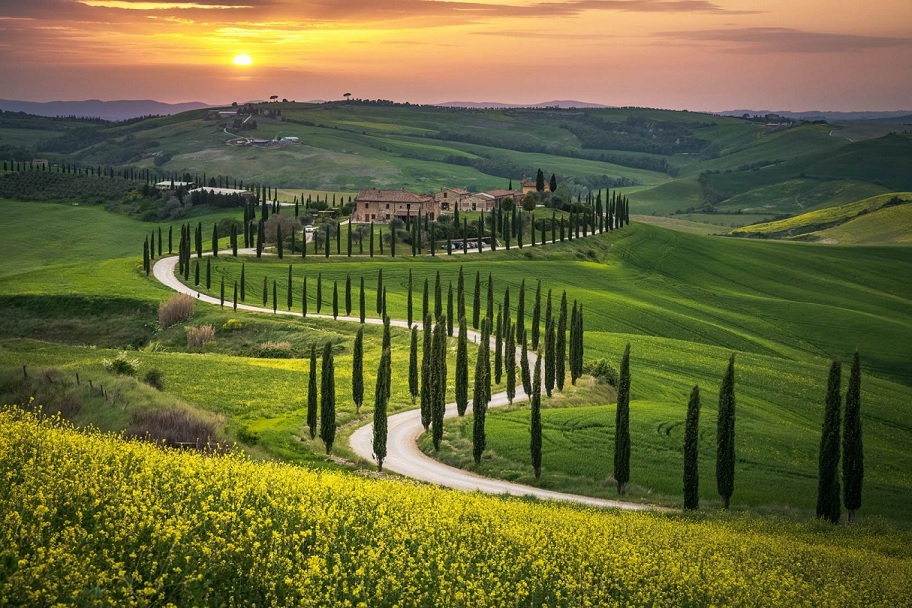
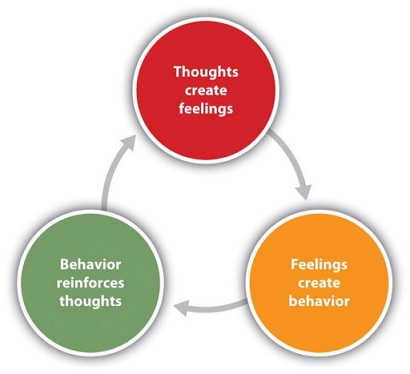
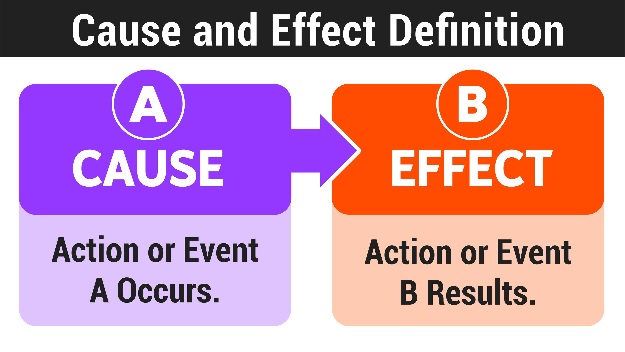
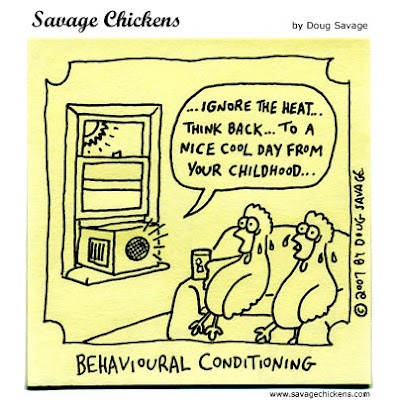
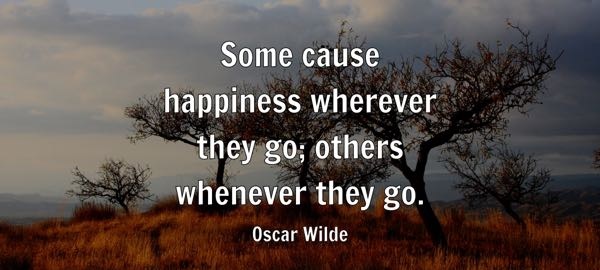
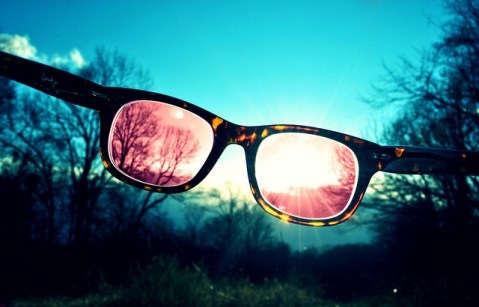







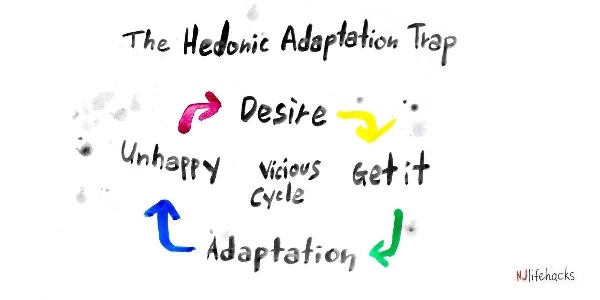
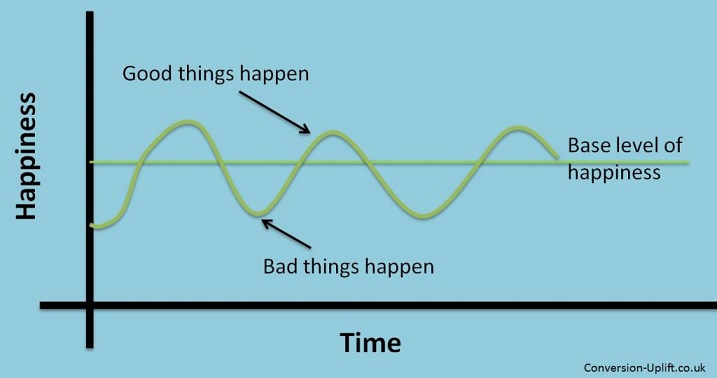









 We know living things are made up of cells and a cell is a “protein-based robot too small to feel or experience anything”
We know living things are made up of cells and a cell is a “protein-based robot too small to feel or experience anything” 







 The psychologist Tim Carey wrote, “It’s a funny thing about the point… we rarely think about the point except in those situations when we question if there is one. Most people… meander through their days… getting on with the business of living by making their lives be the way they want them to be” (
The psychologist Tim Carey wrote, “It’s a funny thing about the point… we rarely think about the point except in those situations when we question if there is one. Most people… meander through their days… getting on with the business of living by making their lives be the way they want them to be” (

 The bigger the discrepancy between what we want and what we get, the more effort we put into reducing that discrepancy.
The bigger the discrepancy between what we want and what we get, the more effort we put into reducing that discrepancy.











 Anna is “a little, mechanical thing of fixed will,” and Tom is “blind, and intent, irritated into mechanical action” (p. 78). They are blind and mechanized. Cut off. Disconnected. Tom is angry and Anna won’t stop crying. Each is alone to the other. Hostility evaporates their empathy. Tom doesn’t care what she wants and Anna doesn’t care what he wants.
Anna is “a little, mechanical thing of fixed will,” and Tom is “blind, and intent, irritated into mechanical action” (p. 78). They are blind and mechanized. Cut off. Disconnected. Tom is angry and Anna won’t stop crying. Each is alone to the other. Hostility evaporates their empathy. Tom doesn’t care what she wants and Anna doesn’t care what he wants.
 Joe Campbell said that, “Every god, every mythology, every religion, is true in this sense: it is true as metaphorical of the human and cosmic mystery. He who thinks he knows doesn’t know. He who knows that he doesn’t know, knows” (
Joe Campbell said that, “Every god, every mythology, every religion, is true in this sense: it is true as metaphorical of the human and cosmic mystery. He who thinks he knows doesn’t know. He who knows that he doesn’t know, knows” (
 Religion and philosophy are guides. Where religion has rituals, philosophy doesn’t. Where religion has supernatural beliefs and a concept of faith—a belief in something without evidence—philosophy doesn’t.
Religion and philosophy are guides. Where religion has rituals, philosophy doesn’t. Where religion has supernatural beliefs and a concept of faith—a belief in something without evidence—philosophy doesn’t.

 Science fiction writer Philip K. Dick (1928-1982) said, “Reality is that which, when you stop believing in it, doesn’t go away” (
Science fiction writer Philip K. Dick (1928-1982) said, “Reality is that which, when you stop believing in it, doesn’t go away” (

 A shift in consciousness towards acceptance, contentment and awareness like Tom Brangwen’s can happen to anyone, anywhere, anytime—even you, even here, even right this second!
A shift in consciousness towards acceptance, contentment and awareness like Tom Brangwen’s can happen to anyone, anywhere, anytime—even you, even here, even right this second!
 Happy feelings that make life worth living don’t just hit unbidden. You cultivate them. Love and enjoyment are nurtured with attention, authenticity and self-understanding. You can learn how to love and enjoy. They are capacities. You are the soil prepared for good feelings to grow.
Happy feelings that make life worth living don’t just hit unbidden. You cultivate them. Love and enjoyment are nurtured with attention, authenticity and self-understanding. You can learn how to love and enjoy. They are capacities. You are the soil prepared for good feelings to grow. To capitalize on our craving, love and enjoyment are used in product branding. Advertisers use the words “love” and “enjoy” interchangeably. To say, “I’m loving it!” is another way of saying, “I enjoy!“
To capitalize on our craving, love and enjoyment are used in product branding. Advertisers use the words “love” and “enjoy” interchangeably. To say, “I’m loving it!” is another way of saying, “I enjoy!“





 Our deepest need is to overcome separateness. It’s why we conform. It’s why we cling to cults, clans and nations. It’s why we participate in the herd activities of sports, politics and drug-fuelled electronic dancing.
Our deepest need is to overcome separateness. It’s why we conform. It’s why we cling to cults, clans and nations. It’s why we participate in the herd activities of sports, politics and drug-fuelled electronic dancing. Garry Shandling (1949-2016) – another great comic with heart – said, “All my journey is, is to be authentically who I am – not trying to be somebody else…. The whole world is confused because they’re trying to be somebody else! To be your true self, it takes enormous work… Ego drives the problems so you have to work in an egoless way” (
Garry Shandling (1949-2016) – another great comic with heart – said, “All my journey is, is to be authentically who I am – not trying to be somebody else…. The whole world is confused because they’re trying to be somebody else! To be your true self, it takes enormous work… Ego drives the problems so you have to work in an egoless way” (
 Feeling self-aware of subtle things in your surroundings with your senses is mind blowing. When self-aware, you are not bored, ever. You are conscious of feelings and desires, but not manipulated by them.
Feeling self-aware of subtle things in your surroundings with your senses is mind blowing. When self-aware, you are not bored, ever. You are conscious of feelings and desires, but not manipulated by them.




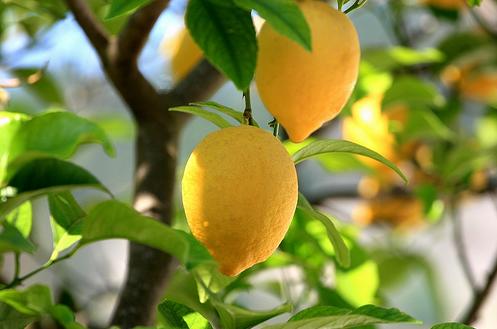 Imagine hearing the song “
Imagine hearing the song “
 Lisa Miller, clinical psychologist at Columbia University Teachers College, says that a strong self-concept, religiosity, spiritual connection and, “An intensely felt, transcendental sense of a relationship with God, the universe, nature or whatever you identify with as a higher power” actually “confers a protective effect in all kinds of disorders” (Maclean’s, Ap. 2015, p. 41-42).
Lisa Miller, clinical psychologist at Columbia University Teachers College, says that a strong self-concept, religiosity, spiritual connection and, “An intensely felt, transcendental sense of a relationship with God, the universe, nature or whatever you identify with as a higher power” actually “confers a protective effect in all kinds of disorders” (Maclean’s, Ap. 2015, p. 41-42). To breathe, to
To breathe, to 


 The battle goes on beneath the surface of consciousness. That’s why you sometimes say, “Why did I do that? Did I say that? That wasn’t me.” Like everybody, you’re under a misconception. You think you know what influences you and how those influences affect you.
The battle goes on beneath the surface of consciousness. That’s why you sometimes say, “Why did I do that? Did I say that? That wasn’t me.” Like everybody, you’re under a misconception. You think you know what influences you and how those influences affect you. First you have a feeling, then you make up something to explain that feeling. The explanation becomes a label. The label is declared true. It influences you. You become a self-fulfilling prophecy primed by what you do.
First you have a feeling, then you make up something to explain that feeling. The explanation becomes a label. The label is declared true. It influences you. You become a self-fulfilling prophecy primed by what you do. But it isn’t.
But it isn’t.

 There’s nothing you must do. There’s no mountain you must climb. Success and failure don’t matter. Just contentment. Contentment is not death! Contentment is bliss! In dictionaries contentment and happiness are interchangeable.
There’s nothing you must do. There’s no mountain you must climb. Success and failure don’t matter. Just contentment. Contentment is not death! Contentment is bliss! In dictionaries contentment and happiness are interchangeable. It’s all in how you frame it. What’s your spin on things? How do you see yourself? Is life bliss-filled or disasterous? You decide. You choose. It’s simple really. Nothing to it. Live a pleasant life by living wisely, justly and well (Epicurus). And yet, living a pleasant life can be difficult when you’re with a species hell-bent on making the earth a landfill.
It’s all in how you frame it. What’s your spin on things? How do you see yourself? Is life bliss-filled or disasterous? You decide. You choose. It’s simple really. Nothing to it. Live a pleasant life by living wisely, justly and well (Epicurus). And yet, living a pleasant life can be difficult when you’re with a species hell-bent on making the earth a landfill. In 1982 when Alice Cooper (aka Vinnie Furnier) sang, “We’re all clones. All are one and one are all” (
In 1982 when Alice Cooper (aka Vinnie Furnier) sang, “We’re all clones. All are one and one are all” (
 Framing is a bias towards a given choice depending how it’s presented. It’s how the cover of a book influences your judgement. Framing moves you to react in certain ways based on how your brain makes comparisons between loss/gain, good/bad, half-full/half-empty. In framing you decide what’s important.
Framing is a bias towards a given choice depending how it’s presented. It’s how the cover of a book influences your judgement. Framing moves you to react in certain ways based on how your brain makes comparisons between loss/gain, good/bad, half-full/half-empty. In framing you decide what’s important.

 “Transcend” comes from Latin trans-, meaning “beyond,” and scandare, meaning “to climb” (
“Transcend” comes from Latin trans-, meaning “beyond,” and scandare, meaning “to climb” (
 The Merrium-Webster Dictionary defines a philosophy of life as: “an overall vision of or attitude toward life and the purpose of life,” but the word “life” has become a symbol and symbols have become things nowadays (
The Merrium-Webster Dictionary defines a philosophy of life as: “an overall vision of or attitude toward life and the purpose of life,” but the word “life” has become a symbol and symbols have become things nowadays ( People think of life in terms of style or metaphor: Life is a jigsaw puzzle (and you don’t have a picture of how it should look), life is a maze (exits avoided), life is an elevator (with ups and downs and people pushing your buttons).
People think of life in terms of style or metaphor: Life is a jigsaw puzzle (and you don’t have a picture of how it should look), life is a maze (exits avoided), life is an elevator (with ups and downs and people pushing your buttons). You can focus attention on breathing – take deep breaths, slow breaths, hold your breath, but after a while, your body kicks in. Your body has a mind of its own. Maybe that explains why people think there’s a divide between body and mind (and world).
You can focus attention on breathing – take deep breaths, slow breaths, hold your breath, but after a while, your body kicks in. Your body has a mind of its own. Maybe that explains why people think there’s a divide between body and mind (and world). On the side of the body is Friedrich Neitzsche. He said that people don’t have bodies, they are bodies. No transcendence but his love of life encompassed dark sides and purposelessness with grit and sobriety. His credo: “Be faithful to the earth!”
On the side of the body is Friedrich Neitzsche. He said that people don’t have bodies, they are bodies. No transcendence but his love of life encompassed dark sides and purposelessness with grit and sobriety. His credo: “Be faithful to the earth!” On the side of mind (extended) is writer D.H. Lawrence who talked of two ways of knowing: “knowing in terms of apartness, which is mental, rational, scientific, and knowing in terms of togetherness which is religious and poetic” (Sex, Lit. and Censorship, 1959, p. 108).
On the side of mind (extended) is writer D.H. Lawrence who talked of two ways of knowing: “knowing in terms of apartness, which is mental, rational, scientific, and knowing in terms of togetherness which is religious and poetic” (Sex, Lit. and Censorship, 1959, p. 108).
 A quick trick to enjoyment is to go through your senses one by one very… very… slowly. See the world as a child and dissolve into awareness. If you’re lucky, all of a sudden in slow motion, a filter you didn’t know was there will disappear and in vividness you’ll walk into a four dimensional picture.
A quick trick to enjoyment is to go through your senses one by one very… very… slowly. See the world as a child and dissolve into awareness. If you’re lucky, all of a sudden in slow motion, a filter you didn’t know was there will disappear and in vividness you’ll walk into a four dimensional picture. A philosophy of life is how you take care of yourself. It’s your intention. In the same way that you can walk without noticing, you can click a switch to consciousness. You can live without paying attention or switch to consciously living. A philosophy of life is your vision. It’s how you picture yourself living.
A philosophy of life is how you take care of yourself. It’s your intention. In the same way that you can walk without noticing, you can click a switch to consciousness. You can live without paying attention or switch to consciously living. A philosophy of life is your vision. It’s how you picture yourself living. 
 Buddhists say, “
Buddhists say, “ Memories of what was and imaginings of what might have been rattle your feelings in a present that hurts but you know you have to go on so when you get back from a very long walk, remember: Rock on.
Memories of what was and imaginings of what might have been rattle your feelings in a present that hurts but you know you have to go on so when you get back from a very long walk, remember: Rock on.